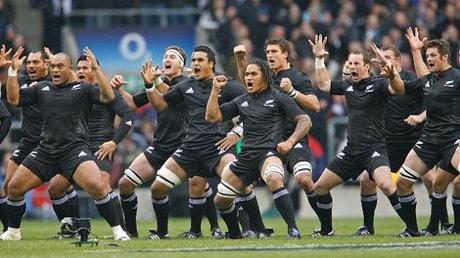 They have won over
76% of their Test matches and are the leading Test match points scorers of all
time. They are the only international side with a winning record against every
country they have played, and since their international debut in 1903 only five
nations have defeated New Zealand in Test matches. New Zealand compete with
Argentina, Australia and South Africa in The Rugby Championship – known as the
Tri Nations before Argentina's entry in 2012.
They have also been named the World Rugby Team of the Year seven times
since 2005.
The team's first
match was in 1884, and their first international match in 1903 against
Australia in Sydney. New Zealand's early
uniforms consisted of a black jersey with a silver fern and white
knickerbockers. They perform a haka – a Māori challenge or posture
dance – before each match. The haka performed has traditionally been Te Rauparaha's
Ka Mate, although since 2005 Kapa o Pango – a modified version has occasionally
been performed.
Kiwis are not the
only team to perform the war dance prior to the match. Fiji, Samoa and Tonga all have their own
tribal dance to perform pre-match as well.
They have won over
76% of their Test matches and are the leading Test match points scorers of all
time. They are the only international side with a winning record against every
country they have played, and since their international debut in 1903 only five
nations have defeated New Zealand in Test matches. New Zealand compete with
Argentina, Australia and South Africa in The Rugby Championship – known as the
Tri Nations before Argentina's entry in 2012.
They have also been named the World Rugby Team of the Year seven times
since 2005.
The team's first
match was in 1884, and their first international match in 1903 against
Australia in Sydney. New Zealand's early
uniforms consisted of a black jersey with a silver fern and white
knickerbockers. They perform a haka – a Māori challenge or posture
dance – before each match. The haka performed has traditionally been Te Rauparaha's
Ka Mate, although since 2005 Kapa o Pango – a modified version has occasionally
been performed.
Kiwis are not the
only team to perform the war dance prior to the match. Fiji, Samoa and Tonga all have their own
tribal dance to perform pre-match as well.
The dance itself is extremely old and cloaked in legend. The All Blacks have been doing it before Tests since the turn of last century. And not any old person can lead it - tradition dictates that the person delivering the initial commands (loosely translated as "Slap your hands on your thighs, stick out your chest, bend your knees") is of Maori heritage. Even those who don't know much about rugby - have heard and seen the "haka" of the All Blacks, a sequence of foot-stomping, tongue-wagging and violent gesticulation, accompanied by deep, rhythmic chanting. The haka was on show Sunday in London, when the All Blacks defeated Argentina in their first match at the the Rugby World Cup. It is an intimidating sight for any opponent lining up against it; on the rugby field, some sides facing New Zealand have attempted ripostes, though they rarely look all that convincing. And, like other powerful symbols of national identity, the haka is no stranger to commercial opportunists. With regards – S. Sampathkumar
23rd Sept. 2015.

